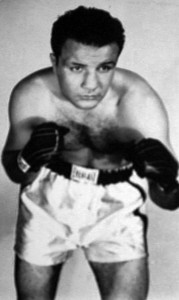Jake LaMotta, the middleweight boxer who was the subject of the Martin Scorcese/Robert De Niro film, was known as the Raging Bull. He’d never stop coming at you, and he simply would not go down.
No matter what punishment was rained upon him (most savagely by Sugar Ray Robinson), Jake LaMotta refused to be knocked out.
Sort of like the traditional publishing industry.
I mean, look at the beating trad publishing has taken in the last few years:
BAM! The Kindle.
BOOM! Amazon offers authors 70%.
WHAM! Barry Eisler turns down half-a-mil from St. Martins.
SMACK! Department of Justice.
OOMPH! Borders goes under.
BOP! Barnes & Noble brick-and-mortar stores on the ropes.
Traditional publishing is reeling! Cut! Blood is on the canvas! The referee steps in to see if he should stop the fight. “How many fingers am I holding up?”
“You’re holding up big six fingers. No, five…”
The referee lets the fight continue. We’re in Round 6 of a scheduled 12 rounder. Will traditional publishing avoid the knockout?
That was the question on everyone’s mind at the Digital Book World Conference in NYC last week. Reports are that the publishing executives who attended were remarkably “upbeat” about the future, even as it remains an uncertain and challenging one.
According to a commissioned survey of 53 publishing executives, 85% of respondents were “optimistic” about the digital transition and 64% say publishers are “capable of competing” in the new digital marketplace. A 55% slice were confident that their own companies can compete. However, both of the latter two figures are down 10% from the same survey last year (source: Publishers Weekly). From the same PW story covering DBW, key executives “offered perspectives that ranged from an enthusiastic embrace of the new technology . . .to being a little bewildered over selling direct.”
Direct! That is one of the key areas where publishers must learn to compete. But according to Marcus Leaver of Quarto Group Publishing, “We sell directly to consumers, but I’m not sure we’re good at it or ever will be good at it.”
Former Macmillan president Brian Napack, now a senior advisor at Providence Equity Partners, was interviewed at DBW about trad publishing’s future. While admitting that the former “big six” may well end up as the “big three,” he believes “the power of innovation often flourishes in markets during periods of consolidation and new companies.”
That last prognosis is the one we’re all waiting to see show up. Traditional publishing is unsteady on its feet right now. It’s wiping blood from its eyes. But it’s not down for a ten count.
What will it have to do to survive and, perhaps, thrive again? At the top of the list has to be substantive responses to the needs and concerns of their sole asset: writers.
Reports are mixed on whether, as a whole, trad publishing is getting that message. A surveyof 5,000 authors — aspiring, traditionally published, self-published and “hybrids” (those who are both traditionally published and putting out a self-publishing line) – reveals the following:
One-third of traditionally published authors are interested in self-publishing their next book. Writes DBW online: “This trend should be worrisome for traditional publishers, which are struggling to demonstrate to the marketplace that they add value to the publishing process in an era where anyone can publish a book.”
That’s the key: Add value. Where does that come from? It used to be via distribution to physical bookstores. But as shelf space dries up, how will that advantage compare to the digital platforms that writers are perfectly able to exploit on their own?
The survey did reveal a spot of good news for Jake LaMotta: Not yet published authors hold a high opinion of traditional publishing, showing the “prestige factor” still remains. Publishers can build on this. But it will require some significant changes in practice, as indicated by the responses of those who have been published traditionally:
While outsiders who probably have among them the next generation of best-selling authors believe that publishers can help them and have fairly high opinions of publishers, those who have experienced both publishers and the alternative have a very low opinion of publishers, by comparison.
Perhaps it is because those authors who have both self- and traditionally published are unreasonably bitter as a group by some slight they experienced at the hand of a publisher. Or perhaps they have made a reasoned comparison of what the publishing industry offered them and what self-publishing offered them and were more satisfied with the latter. Either way, it would suggest that traditional publishers could do more to woo and impress published authors.
The good news for publishers is that aspiring writers still believe in their ability to help them. It’s not too late for publishers to improve their services to authors to attract and retain the next generation of best-selling authors.
So will this Raging Bull of industry still be around in twenty years? I think so. I’d like it to be. I’m a hybrid, and traditional publishing’s been good to me. But it will have to fight smarter, not just harder. (One comment made by an editor at DBW shocked the binding out of me. He said at his company “there are 42 people who have to touch a book to get it published.” Unless he was kidding, or answering the ultimate question of Life, the Universe and Everything, that is not a recipe for fast feet and effective counter punching.)
So consider me sitting at ringside, shouting, “Cover up! Watch his left! Work the body! The body!”
What are you shouting to the traditional publishing industry?
Jake LaMotta, by the way, is 89 years old. And he’s still on his feet.




Jake looks like he could still kick posterior and take names with authority, Jim.
When the digital world hit the music industry their were predictions of its demise. There was consolidation, for sure, but the smaller companies filled in some of the cracks and it is still there; it’s just not as big. The niche businesses seem to be doing well; Columbus has five or six vinyl record stores and Louisiana Music Factory in New Orleans has watched Tower Records and Virgin Megastore come and go by selling nothing but Louisiana music and related items. I think that some publishers, and bookstores, might have to specialize to stay alive, but they’ll still be there when the dust settles and the smoke clears.
Joe, I think you’re right on. Mike Shatzkin, the industry observer who masterminds DBW, emphasizes that publishers need to think in “verticals,” which is another name for niche. And there is always room for a fast, smart, small company in any industry-wide upheaval.
Lots of interesting data in your post, Jim. The key element that jumped out at me was “added value”. I spent decades in the corporate world as a marketing director. Added value was the key to success. You can give the customer what everyone else is offering, or you can add the extra ingredient that no one else does. And if everyone else adds that extra twist, you make it better or more unique. Right now, a lot of mid-list authors with multiple books published are finding less and less added value with traditional publishing. And in comparison to the indie publishing alternative, many are finding no value at all to legacy publishers.
It may be a different story for aspiring authors yet to be published, and the successful bestsellers. But the guys stuck in the middle now have a viable alternative that can and does work.
I think it’s also important to remember that this is a big world with thousand and thousands of foreign publishers out there, many of whom buy the translation rights to domestic books. Whoever manages to expand the international sales of domestic indie authors will hold a major advantage in added value to the indie alternative.
Good points, Joe. Foreign rights is indeed a growth area, and not just for writers. An enterprising agent, IP lawyer or small company could mark out a speciality here to serve indie writers.
Jim, As usual, a thought-provoking post. Because you are a “hybrid,” one foot in each of the worlds of publishing, you are in a unique position to assess and comment on the situation.
I agree with the two Joes that traditional publishing isn’t ready for the 10-count yet, but it will have to change its approach and strategy to survive. I’ll be watching, and appreciate your playing the role of Don Dunphy in all this.
Don Dunphy! Well played, Doc.
You also brought to mind my favorite ring announcer, the great Jimmy Lennon, voice of the Olympic Auditorium in LA. What a set of pipes he had.
I do like the idea of traditional publishing being the foot-in-the-door to weed out the books that are not yet ready for publication.
I know, with my first book, I thought it was ready long before it actually was and am now glad it wasn’t published at that point. It took the rejection letters to make me go back and fix it before finally someone said “Yes, I’ll publish that”.
In the meantime, I learned A LOT about the craft and what to look for in a finished piece. Perhaps now, after two traditionally published books, I’ll have a better eye for a finished product, but without that buffer there will be a lot of unready works being self-published.
The act of finding and agent and selling to a house acts as a gateway to make sure the author and manuscript are actually ready for the reader.
Victoria Allman
author of: SEAsoned: A Chef’s Journey with Her Captain
Frankly I’ve stopped blogging about all this. Said it all years ago. When someone at DBW said the hot term was “hybrid” author, I had to put a link to a June 2011 blog where I used the term. A year ago DBW and traditional publishing was a year behind. This year they both were 18 months behind. They’re not catching up, they’re falling behind. When the guy who puts DBW on is so focused on having print distribution (which his own book doesn’t have BTW) I lost interest.
Bob, I spoke to one publishing exec who attended this year’s conference, and he said pretty much the same thing. There was a “sameness” to it, the same issues being discussed (he felt).
What interests me is that I truly think we are in the middle rounds of this bout. It is fascinating to watch what the strategy will be.
Meanwhile, those who can move fast — writers and publisher both — have opportunities to prosper.
I hated that movie.
Jim, I want you to know how much I look forward to the Sunday posts.
As a writer who runs with writers, I agree, that picking up the pace is a big key. Just like the furry little mammals made a living darting around and grabbing the dinosaurs leavings, the smaller, more adaptive companies are scooping up darn good books and getting them to market in shorter time.
Among my friends, two legit small presses come to mind – Musa and Samhain. Their writers are their biggest cheerleaders and they are both seeing modestly increasing success with every round of books they issue.
For one thing, the big boys still don’t get social media. I’ve seen one clever Facebook promo driven by a big publisher (if the author got X-number of ‘likes’ they would drop the book 2 weeks sooner, great way to build an on-line mailing list).
As a reader, my main complaint with the bigs is the time (42 handlers? Really?) A writer tweets that he has turned in the final edits and all the fans are like, “so when?” and the answer is “10 months from now!” And the buzz just goes . . . flat.
And with the small presses, the social media is usually a major player, a senior editor giving out the goodies and the updates. That matters. One small press announced a new line and invited writers to email for the story-bible. I emailed and it came from the editor-in-chief’s account. Yeah, it may have been an intern that actually pressed ‘send,’ but the appearance was there.
Yes, the bigs do have the advantage of the unpublished pool. We are all out here going “pick me pick me!” Even those that are picked are probably going to sour and go indie or hybrid as they discover the emperor wasn’t what he promised. But, they will have developed some cred and learned the biz in the meantime.
Trad publishing is still bootcamp. Working with one decent editor will rocket a writer from amateur to semi-pro and that writer will continue to grow from there. The bigs aren’t going anywhere. But they do have their own survival in their own hands and can’t discount the little critters who are getting smarter every day.
Terri, thanks for the good word and the good thoughts. Spot on.
If the publishers are on the ropes, it’s because they showed up to the fight 50 lbs overweight and with a two pack a day cigarette habit. Everything that is happening to them now is their fault, 100%.
Meanwhile, thank God for Amazon. They are breaking the stranglehold of corporate publishers and the result will be better for all authors, whether or not all these authors are forward thinking enough to see it that way is another matter. But when the big publishers are forced to raise royalty rates and start treating authors like a valued part of the process instead of a necessary evil they have to put up with in order to do business, we all win.
Also, Barry Eisler turned down a big traditional deal, true, but not to self publish. He just switched from one major publisher, St Martins, to another, Thomas & Mercer.
Actually, Barry’s move was to self-pub. He did this before Thomas & Mercer existed. He worked that deal out later, and I seem to recall a little blowback from the indie community wondering what was up with that.
Great post as always. I think it will be very interesting to see what happens in future rounds. I’m hoping the ‘hybrid’ author can add the value readers seek – more and more it’s really the author’s call not the publishers.
To take the fighter metaphor one more step, I’m thinking this is Liston vs. Clay, 1964. Liston was huge, slow and out of shape. Clay was brash, fast and nimble.
Traditional publishing is not on the mat but it knows it has to change its style. It means changing the pubbing model (returns and discounting policies, archaic royalty payments and statements, out-moded marketing techniques, collusion with NYT bestseller lists) and maybe more important, their relationship with writers.
It’s ridiculous, as you said James, that there are 20 layers of BS to plow through to get a book published these days. There’s no reason it should, given technology, a year to get a novel out AFTER it’s turned in. There’s no reason ACTUAL SALES can’t be the criterion to determine bestseller status.
But don’t get me started… 🙂
First of all I can’t believe that the Big 6 would be able to stay in business publishing ebooks priced at $12.99 and over. I’ve actually stopped buying ebooks that expensive. I’d rather give a newbie author who is either self-pubbed or with a small press a chance at a lower price than pay that. Also, now that I’m published (with a small press) I’ve found that your average reader thinks everyone is self-pubbed so amongst readers I’ve found absolutely no distinction. The very first question I get asked when people find out I have a book out is, “How much did that cost?” because they just automatically assume I’ve done it myself. The only people who seem concerned with whether I am with a publisher of some kind are other writers. I’m thrilled to be with my publisher, but it’s been pretty shocking to see how the perception of publishing among people who aren’t IN the industry has changed since self-pubbing became more the norm. I’d really like to see a hybrid myself. I wouldn’t want traditional publishing to go under but I think they seriously need to re-evaluate their ebook pricing.
As the daughter of the man who first wrote Raging Bull in 1963, and as a trad-pub author who is working on her second non-fiction book, I found your post to be very clever and informative. Great analogy! P.S.: I think Jake is 91 and just got married for the seventh (?) time! http://petersavagefilms.com
I’ve seen something similar in the Roleplaying Game field. When ebooks came out there was a fair amount of trouble in adapting only one company did not fully accept the digital revolution (they keep coming in an out).
What was interesting to see was the DRM was dropped by the largest RPG online store (and not put in by other online RPG companies) and prices were always cheaper on electronic versions than physical products.
I’m self published but I def. want all publishers to make it. I’ve def. seen a trend lately where even with trad. pubbed books sometimes the ebook is doing better on Amazon than the hardcover and that’s within days or weeks of the release. If the royalty is so low, how are these authors earning any money? They must be losing money, not only with advances but after they sell through.